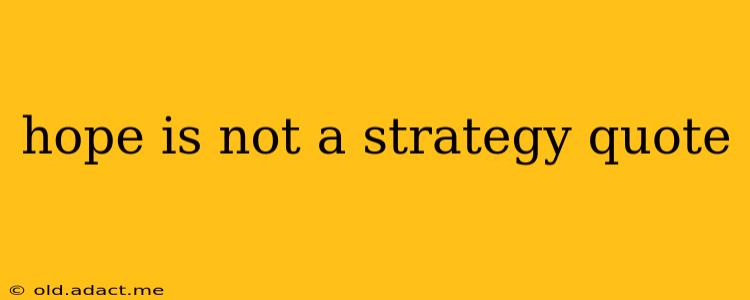The popular phrase, "Hope is not a strategy," is a powerful reminder that wishful thinking won't cut it in business, life, or achieving any significant goal. While optimism and a positive outlook are invaluable, they're insufficient without a concrete roadmap. This post delves deeper into why hoping for the best isn't enough and explores how developing a robust strategy can pave the way for success.
What Does "Hope Is Not a Strategy" Really Mean?
At its core, the saying highlights the difference between desire and action. Hoping for a positive outcome is passive; it involves wishing for things to work out without actively working towards that outcome. A strategy, conversely, is an active, planned approach involving specific steps, resource allocation, and contingency planning. It's about proactively shaping your future instead of passively waiting for it to unfold. Simply hoping your business will succeed without a solid marketing plan, for example, is a recipe for disappointment.
Why Hoping Isn't Enough: The Importance of a Well-Defined Strategy
Relying on hope ignores crucial elements of success:
- Uncertainty Mitigation: A well-defined strategy anticipates potential roadblocks and develops solutions. Hope offers no such safeguard.
- Resource Allocation: Strategies prioritize resources—time, money, effort—towards achieving specific goals. Hope, on the other hand, is a diffuse force, incapable of effective resource management.
- Measurable Progress: Strategies incorporate metrics to track progress and adjust course as needed. Hope provides no such framework for measurement and evaluation.
- Accountability: A strategy holds you accountable for specific actions and results. Hope offers no mechanism for self-assessment or improvement.
What Makes a Strong Strategy?
A successful strategy incorporates several key elements:
- Clear Goals: Define your objectives clearly and concisely, making them Specific, Measurable, Achievable, Relevant, and Time-bound (SMART).
- Actionable Steps: Break down your goals into smaller, manageable steps with clear deadlines.
- Resource Identification: Identify and allocate the necessary resources—financial, human, and technological.
- Risk Assessment: Analyze potential risks and develop contingency plans to address them proactively.
- Regular Review and Adjustment: Monitor progress regularly, adapt to changing circumstances, and make necessary adjustments to your strategy.
How Can I Develop a Strategy?
Developing a strategy is an iterative process, often involving:
- Market Research: Understand your target audience, competition, and market trends.
- SWOT Analysis: Identify your strengths, weaknesses, opportunities, and threats.
- Competitive Analysis: Analyze your competitors' strategies and identify areas for differentiation.
- Scenario Planning: Develop multiple potential scenarios and strategies to address various outcomes.
What Are Some Common Examples Where Hope Fails as a Strategy?
Many real-world examples illustrate the pitfalls of relying on hope:
- Business Failure: Hoping for customers without a marketing strategy will likely lead to business failure.
- Weight Loss: Wishing for weight loss without a diet and exercise plan will likely result in no change.
- Career Advancement: Hoping for a promotion without demonstrating competence and initiative will likely lead to disappointment.
Can Hope Play a Role in Success?
While hope alone is insufficient, it can be a valuable complement to a strong strategy. Maintaining a positive attitude and belief in your ability to succeed can provide motivation and resilience when faced with challenges. The key is to balance hope with action, using hope as fuel to drive your strategic efforts.
Conclusion: Hope as a Mindset, Not a Plan
In conclusion, "hope is not a strategy" means that merely wishing for success is not enough. To achieve significant goals, you need a well-defined plan of action – a strategy—that incorporates clear goals, actionable steps, resource allocation, risk assessment, and regular review. While a positive mindset fueled by hope is essential, it must be coupled with a proactive and strategic approach to ensure success. Don't just hope for the best; plan for it.
